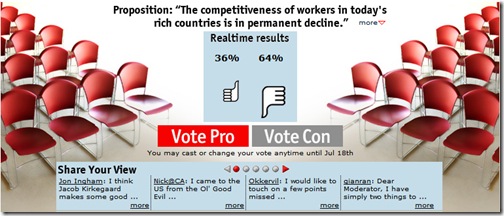My comments on the latest Economist debate focusing on the changing competitiveness and employment between developed and developing countries:
"I think Jacob Kirkegaard makes some good points. The world’s human capital is becoming more evenly distributed – as developing economies catch up in terms of skills and productivity – and as temporary and permanent movements between countries increase. And technology will continue to obliterate some jobs in developed economies – although in the main I think technology tends to change rather than eliminate the demand for human activity.
In opposition, Lynda Gratton makes some very good points too, although I think these are unfortunately largely irrelevant to the central argument. I would agree that competitiveness rests largely within sectors and communities, but this doesn’t impact the partly well-founded fears and anxieties felt by the middle classes in developed countries as some jobs continue to move abroad.
Countries need to do more than simply create an environment in which multinationals can thrive as this isn’t necessarily going to significantly influence the level of employment. And even if a country’s culture is going to impact its competitiveness, there is little it can do to influence these national characteristics in the short-term.
To me, the debate emphasises the need for developed countries to focus on the ‘high road’ path to further development – clarifying the areas in which they’re able to remain competitiveness, and ensuring they are developing the human capital that will enable them to sustain this advantage.
And this is why I only partly oppose Jacob Kirkegaard’s proposition. Educational stagnation in the West is a problem, and further / better education, linked to a country’s competitive advantage, remains the best way to keep the spectre of fear at bay."
Join the debate!































Jon, I missed the debate. I see the "con" carried the day.
ReplyDeleteDid the debate through up the challenges that people see and the solutions?
Was the sense of the meeting that people are panicking unnecessarily about the competition and loss of jobs?
Hi Jo, the moderator said he was surprised the motion was defeated so strongly. I personally think the reason that it was is that there will have been a high proportion of Economist readers among the contributors. I think for many of them, free trade and globalisation are such sacred cows that it will have been difficult accepting the disadvantages. Maybe for me too?
ReplyDelete